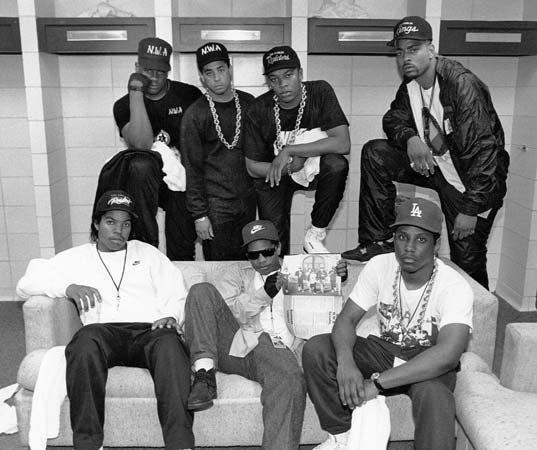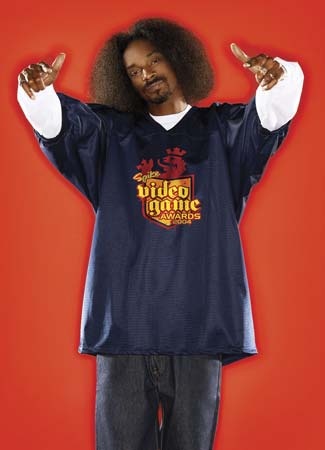gangsta rap
hip-hop music
 form of hip-hop music that became the genre's dominant style in the 1990s, a reflection and product of the often violent lifestyle of American inner cities afflicted with poverty and the dangers of drug use and drug dealing. The romanticization of the outlaw at the centre of much of gangsta rap appealed to rebellious suburbanites as well as to those who had firsthand experience of the the harsh realities of the ghetto.
form of hip-hop music that became the genre's dominant style in the 1990s, a reflection and product of the often violent lifestyle of American inner cities afflicted with poverty and the dangers of drug use and drug dealing. The romanticization of the outlaw at the centre of much of gangsta rap appealed to rebellious suburbanites as well as to those who had firsthand experience of the the harsh realities of the ghetto.Gangsta (“gangster”) rap first came to prominence on the East Coast. Schoolly D, of Philadelphia, presented graphic tales of gangs and violence such as “PSK—What Does It Mean?” (1985); and Boogie Down Productions, formed in New York City by DJ Scott LaRock (Scott Sterling) and KRS-One (Lawrence Krisna Parker), offered hard-hitting depictions of crack-cocaine-related crime on Criminal Minded (1987). In Houston, Texas, the Geto Boys' sex- and violence-dominated music was the subject of outrage in some corners. But gangsta rap became a national phenomenon in California, where a distinct school of West Coast hip-hop began with Eazy E's Los Angeles group N.W.A. (Niggaz With Attitude).
In Oakland, Too $hort had become a major regional force, and his profane and sexually explicit style influenced N.W.A. member Ice Cube's early writing. It was N.W.A.'s controversial album Straight Outta Compton, however, that shifted hip-hop's geographic centre. The most distinguishing characteristic of N.W.A.'s approach was the very plain way that violence was essayed: as plainly as it occurred in the streets of south-central Los Angeles and neighbouring Compton, argued the group. Hyperrealism was often conflated with myth and declarations of immortality; exaggeration became a kind of self-protective delusional device for listeners who were actually involved in the dangerous lifestyle N.W.A. was chronicling.
In the mainstream press and among African Americans nationwide, N.W.A., by virtue of their name, single-handedly reignited a debate about the word nigger. Its appropriation by black youth transformed it into a positive appellation, argued Ice Cube. For many, the persistent misogyny in N.W.A.'s work, which was alternately cartoonish and savage in its offensiveness, was less defensible.
 As N.W.A. splintered, the group's importance multiplied with each solo album. Ice Cube's AmeriKKKa's Most Wanted (1990) employed Public Enemy's production team, the Bomb Squad, and introduced New York City listeners to the West Coast sound, known by this point as gangsta rap. In 1992 N.W.A. producer and sometime rapper Dr. Dre released the California rap scene's most influential and definitive record, The Chronic; its marriage of languid beats and murderous gangsta mentality resulted in phenomenal sales. Most significantly, it launched Death Row Records and the career of Snoop Doggy Dogg.
As N.W.A. splintered, the group's importance multiplied with each solo album. Ice Cube's AmeriKKKa's Most Wanted (1990) employed Public Enemy's production team, the Bomb Squad, and introduced New York City listeners to the West Coast sound, known by this point as gangsta rap. In 1992 N.W.A. producer and sometime rapper Dr. Dre released the California rap scene's most influential and definitive record, The Chronic; its marriage of languid beats and murderous gangsta mentality resulted in phenomenal sales. Most significantly, it launched Death Row Records and the career of Snoop Doggy Dogg.As early as 1988, other important artists from California began making an impression. Like Too $hort, Ice-T relied on his self-styled image as a pimp to propel sales; though his lyrics were well-respected, his single “Cop Killer" (1992), like gangsta rap in general, raised controversy. N.W.A.'s influence could be heard in groups like Compton's Most Wanted, DJ Quik, Above the Law, and countless other gangsta groups, but by the early 1990s groups had surfaced whose approach was the antithesis of N.W.A.'s violence and misogyny. The jazzily virtuosic improvisers Freestyle Fellowship and the Pharcyde, of Los Angeles, and Souls of Mischief, of Oakland, owed more to East Coast abstractionists De La Soul and A Tribe Called Quest than to gangs. Nevertheless, by the mid-1990s Death Row Records and Bad Boy Records were engaged in a “coastal battle.” Life imitated art imitating life; the violence that had been confined to songs began to spill over into the world, culminating in the tragic murders of the Notorious B.I.G. (Christopher Wallace), a rapper from New York City, and Tupac Shakur (2pac), a California rapper.
- Faro
- faro
- Faroe Islands
- Faroese language
- Faroese literature
- Faro River
- Farouk I
- Farquhar, George
- Farragut, David
- Farrakhan, Louis
- Farrant, Richard
- Farrar, Frederic William
- Farrar, Geraldine
- Farrar, Margaret Petherbridge
- Farrell, Eileen
- Farrell, James T.
- Farrell, Suzanne
- Farrer, William James
- Farrukhabad-cum-Fatehgarh
- Farrukh Beg
- farthingale
- farthingale chair
- Fartlek
- Farès, Nabile
- Farāh